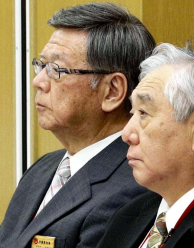Before dispute committee, Okinawa Governor calls Henoko land reclamation “egregious act of folly”

Governor Takeshi Onaga (left) attending a meeting of the Committee for Settling National-Local Disputes on April 22 at the Ministry of Local Affairs and Communications
April 23, 2016 Ryukyu Shimpo
On April 22, at the Ministry of Local Affairs and Communications, the Committee for Settling National-Local Disputes held its third meeting regarding the U.S. Marine Corps Air Station Futenma relocation issue. Last year, Okinawan Governor Takeshi Onaga rescinded the permit authorizing reclamation of land in Henoko, Nago in order to build new facility to replace Futenma. In response, Japan’s Minister of Land, Infrastructure, Transport and Tourism (MLITT), Keiichi Ishii, submitted a rectification order demanding that Onaga reinstate the permit. The Committee is reviewing whether the MLITT’s order was appropriate.
Representatives from both the Okinawa prefectural government and the Japanese national government made statements at the April 22 meeting. Representing Okinawa, Governor Onaga stated he fears the reclamation of land in Henoko will be remembered by future generations as an egregious act of folly that caused a treasure with value to all of humanity to vanish from the face of the earth. Meanwhile, national government representatives argued that there were no legal flaws in the land reclamation authorization, and even if flaws were to exist, rescinding the authorization would still not be permitted from the standpoint of protecting trust among the related parties. After hearing from both sides, the Committee discussed in private and decided to send written questions to the two parties. The Okinawa prefectural government has requested that Nago Mayor Susumu Inamine be allowed to testify before the Committee as well, and it will discuss whether or not to grant this request at a future meeting.
At the meeting, the two sides disagreed on three main points: (1) Whether national defense and diplomatic decisions can fall within the purview of a review of the interpretation of the Public Waters Reclamation Law; (2) The advantages and disadvantages incurred by authorizing the land reclamation and by rescinding said authorization; and (3) Whether there were legal flaws in the original request for authorization to reclaim land.
In his statement, Governor Onaga referenced the historical background in which Okinawan land was seized using bayonets and bulldozers, and discussed the importance of conserving the rich national environment in Oura Bay. He pointed to the fact that the land reclamation authorization by former Governor Hirokazu Nakaima did not meet the requirements stipulated in the Public Waters Reclamation Law. “Building a new, permanent military base in Okinawa means perpetuating the disproportionate burden and damage inflicted upon Okinawa due to the concentration of U.S. military bases,” Onaga said.
Representing the MLITT, Ministry of Justice Litigation Bureau Chief Makoto Jozuka told the Committee that Governor Onaga’s rescinding of the permit was an illegal overreach and abuse of his discretionary power. Jozuka explained that rescinding the permit will have a significant negative impact. He asserted that the Henoko relocation plan is highly rational from the perspective of maintaining the U.S.-Japan alliance, explaining that the former governor’s authorization of the land reclamation permit enabled the U.S. Congress to unfreeze the budget allocated to moving some of the U.S. Marines in Okinawa to Guam.
The Committee has requested that the Okinawa prefectural government submit a response to its written questions by May 2. After it receives Okinawa’s response, it will submit written questions to the MLITT, requesting a response by May 9.
(English translation by T&CT and Sandi Aritza)
Previous Article:Constitutional scholar Setsu Kobayashi: Henoko base construction is flagrant constitutional violation
Next Article:Film shows former village where Futenma Air Station now stands
[Similar Articles]
- Governor Onaga announces a third lawsuit over Henoko land reclamation
- Governor to exercise authority even if defeated in court
- Prime minister accepts Henoko settlement, will suspend land reclamation work
- Onaga: “Government trying to wrest Okinawa into submission” with lawsuit
- Trial over Henoko protest suit to be held at Naha District Court
 Webcam(Kokusai Street)
Webcam(Kokusai Street)


